| Anthochaera | |
|---|---|
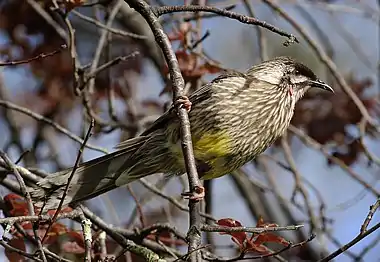 | |
| Red wattlebird (Anthochaera carunculata) | |
| Scientific classification | |
| Domain: | Eukaryota |
| Kingdom: | Animalia |
| Phylum: | Chordata |
| Class: | Aves |
| Order: | Passeriformes |
| Family: | Meliphagidae |
| Genus: | Anthochaera Vigors & Horsfield, 1827 |
| Type species | |
| Anthochaera carunculatus[1] Vigors & Horsfield, 1827 | |
| Species | |
|
See text | |
Anthochaera is a genus of birds in the honeyeater family. The species are endemic to Australia and include the little wattlebird, the red wattlebird, the western wattlebird, and the yellow wattlebird. A molecular phylogenetic study has shown that the regent honeyeater also belongs in this genus.
Description
Of the five species in the genus only the yellow wattlebird (Anthochaera paradoxa) and the red wattlebird (A. carunculata) have the wattles of their common name.[2] These are bare fleshy appendages, usually wrinkled and often brightly coloured, hanging from the cheeks, neck or throat, and presumably serving for display.
A common name for species of the genus is wattlebird, a term also used for unrelated avian species.
Taxonomy
The genus Anthochaera was introduced in 1827 by the naturalists Nicholas Aylward Vigors and Thomas Horsfield.[3] The name is derived from the Greek anthos meaning flower or bloom and khairō meaning to enjoy.[4] The type species was designated as the little wattlebird by the German ornithologist Hans Friedrich Gadow in 1884.[5][6]
The regent honeyeater (Anthochaera phrygia) was formerly placed in its own genus, Xanthomyza, but placed with the Anthochaera genus in a 2004 molecular phylogenetic study.[7][8] The genus Anthochaera is sister group to the species Acanthagenys rufogularis, the spiny-cheeked honeyeater, separated as a monotypic genus.[9]
| ||||||||||||||||||||||||||||||||||||
| Cladogram showing the relationship between species.[9] |
Species and distribution
The genus Anthochaera contains the following species:[8]
| Image | Common name | Scientific name | Distribution |
|---|---|---|---|
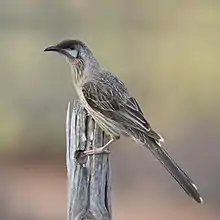 | Red wattlebird | Anthochaera carunculata | southeast Queensland, New South Wales, Victoria, South Australia and southwest Western Australia |
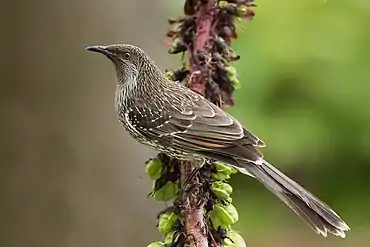 | Little wattlebird | Anthochaera chrysoptera | coastal and sub-coastal south-eastern Australia |
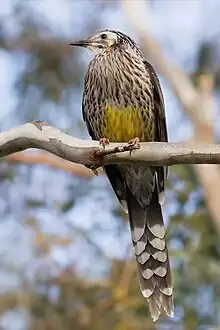 | Yellow wattlebird | Anthochaera paradoxa | Tasmania |
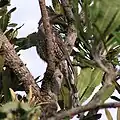 | Western wattlebird | Anthochaera lunulata | south-western Australia. |
.jpg.webp) | Regent honeyeater | Anthochaera phrygia | south-eastern Australia |
See also
References
- ↑ "Melaphagidae". aviansystematics.org. The Trust for Avian Systematics. Retrieved 2023-07-16.
- ↑ Higgins, P.; Christidis, L.; Ford, H.; Bonan, A. (2008). "Honeyeaters (Meliphagidae)". In del Hoyo, J.; Elliott, A.; Sargatal, J.; Christie, D.A.; de Juana, E. (eds.). Handbook of the Birds of the World Alive. Lynx Edicions. doi:10.2173/bow.meliph3.01. S2CID 241635246. Retrieved 23 January 2017.
- ↑ Vigors, N.A.; Horsfield, T. (1826). "A description of the Australian birds in the collection of the Linnean Society; with an attempt at arranging them according to their natural affinities (Part 1)". Transactions of the Linnean Society of London. 15 (1): 170–331 [320–321]. doi:10.1111/j.1095-8339.1826.tb00115.x. The title page gives the year as 1826 but the issue was not published until 1827.
- ↑ Jobling, J.A. (2010). The Helm Dictionary of Scientific Bird Names. London: Christopher Helm. p. 49. ISBN 978-1-4081-2501-4.
- ↑ Gadow, Hans (1884). Catalogue of the Passeriformes or Perching Birds in the Collection of the British Museum. Catalogue of the Birds in the British Museum. Vol. 9 Cinnyrimorphae: containing the families Nectariniidae and Meliphagidae (Sun-birds and Honey-eaters). London: Trustees of the British Museum. p. 262.
- ↑ Salomonsen, F. (1967). "Family Maliphagidae, Honeyeaters". In Paynter, R.A. Jnr. (ed.). Check-list of birds of the world (Volume 12). Vol. 12. Cambridge, Mass.: Museum of Comparative Zoology. pp. 338–450 [444–445].
- ↑ Driskell, A.C.; Christidis, L. (2004). "Phylogeny and evolution of the Australo-Papuan honeyeaters (Passeriformes, Meliphagidae)". Molecular Phylogenetics and Evolution. 31 (3): 943–960. doi:10.1016/j.ympev.2003.10.017. PMID 15120392.
- 1 2 Gill, Frank; Donsker, David (eds.). "Honeyeaters". World Bird List Version 5.4. International Ornithologists' Union. Retrieved 26 December 2015.
- 1 2 Marki, P.Z.; Jønsson, K.A.; Irestedt, M.; Nguyen, J.M.; Rahbek, C.; Fjeldså, C. (2017). "Supermatrix phylogeny and biogeography of the Australasian Meliphagides radiation (Aves: Passeriformes)". Molecular Phylogenetics and Evolution. 107: 516–529. doi:10.1016/j.ympev.2016.12.021. hdl:10852/65203. PMID 28017855.
External links
- Wattlebird videos on the Internet Bird Collection